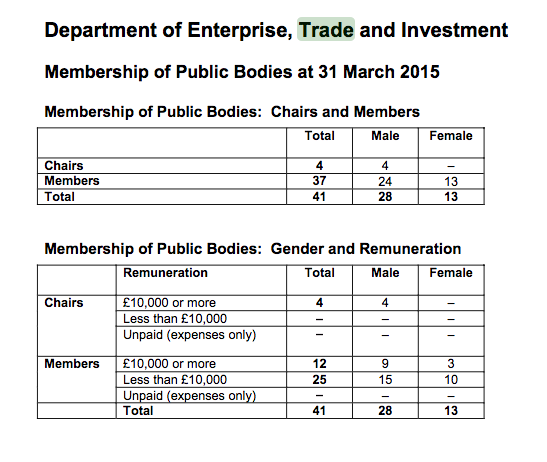 A Department of Economic Development file DED/3/466A [selective scan] now released under the 30/20 Year Rule contains its preparations for inclusion in the 1989/1990 annual report of the Equal Opportunities Commission.
A Department of Economic Development file DED/3/466A [selective scan] now released under the 30/20 Year Rule contains its preparations for inclusion in the 1989/1990 annual report of the Equal Opportunities Commission.
The figures pertain to the gender balance of the 50 public bodies for which DED was responsible.
In 1990, nine DED bodies had no members at all.
Only a quarter of those that were not dormant had 1 or more woman appointed.
In total, women accounted for just 1 in 6 of the membership (128 of the 765 appointments).
These were just the figures for DED and I couldn’t quickly turn my hand to the Equal Opportunities Commission annual report for the overall picture across all departments.
 The Office of First Minister and deputy First Minister’s annual report for 2014/5 on public bodies and public appointments reveals that as well culling many of these bodies – the Department of Enterprise, Trade and Investment was now responsible for just four – the gender balance had improved, though had not reached parity.
The Office of First Minister and deputy First Minister’s annual report for 2014/5 on public bodies and public appointments reveals that as well culling many of these bodies – the Department of Enterprise, Trade and Investment was now responsible for just four – the gender balance had improved, though had not reached parity.
Of those four bodies, women now made up 31.7% of membership, nearly double the proportion in 1990.
Looking wider than DETI, women made up 38% of the public appointments made through OFMdFM (figures for 31 March 2015) though just 22% of chairs of bodies were female. A further table shows that the male/female balance varied depending on the level of remuneration associated with the appointment. Women were more likely to be appointed to unpaid (expenses only) board member roles (42%) than posts which attracted remuneration of £10,000 or more (33%).
A further table shows that the male/female balance varied depending on the level of remuneration associated with the appointment. Women were more likely to be appointed to unpaid (expenses only) board member roles (42%) than posts which attracted remuneration of £10,000 or more (33%).
 In her latest annual report for 2015/16, the Commissioner for Public Appointments Northern Ireland Judena Leslie notes:
In her latest annual report for 2015/16, the Commissioner for Public Appointments Northern Ireland Judena Leslie notes:
“In this context the Northern Ireland Administration has taken an important step towards achieving a more progressive public sector. In March 2016 Northern Ireland Executive Ministers agreed ground breaking targets for the appointment of women to public bodies. It was announced that by 2017/18 there should be gender equality for appointments made in-year; and by end-year 2020/21 there should be gender equality for all appointees in post, reflected both in board membership and at chair level.”
Alan Meban. Tweets as @alaninbelfast. Blogs about cinema and theatre over at Alan in Belfast. A freelancer who writes about, reports from, live-tweets and live-streams civic, academic and political events and conferences. He delivers social media training/coaching; produces podcasts and radio programmes; is a FactCheckNI director; a member of Ofcom’s Advisory Committee for Northern Ireland; and a member of the Corrymeela Community.
Discover more from Slugger O'Toole
Subscribe to get the latest posts to your email.
